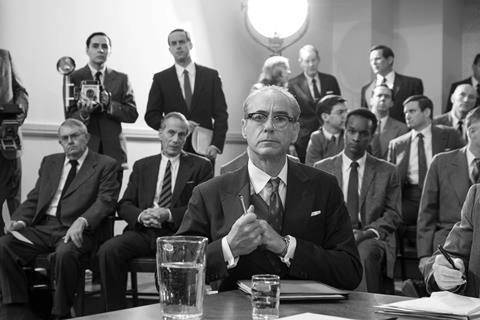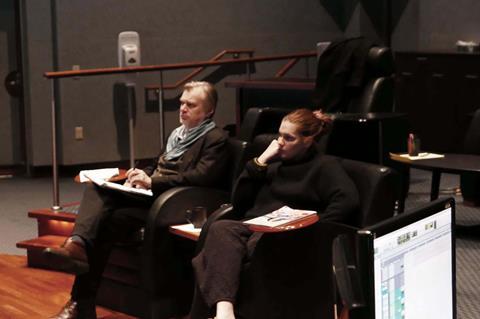For Jennifer Lame, editing Christopher Nolan’s Oppenheimer was all about building momentum and suspense over the epic run time. The editor tells Screen how her pivot from indie films placed her at the centre of the Barbenheimer phenomenon.

Jennifer Lame does not have any relations in the film industry, but she credits her father for the instincts that have made her one of Hollywood’s most sought-after editors. “He’s a private detective,” she says, “and I think I’ve inherited his fascination with uncovering and unravelling and analysing things, and also just getting deep inside something. Editing allows you to do that.”
If ever there was a film that demanded a detective’s ability to assemble fragments of information into a compelling narrative, it is Oppenheimer, Christopher Nolan’s virtuoso biopic of J Robert Oppenheimer, the father of the atomic bomb. It seems as if it would be mindbendingly difficult to piece together, spanning decades, juggling timelines, switching between colour and monochrome, and between digital, film and Imax.
“No, for me it was great,” laughs Lame, in the tearoom of London’s Corinthia hotel. “I loved it. I’m a pretty anxious, negative person. Every movie I work on, I’m like, ‘This is a disaster.’ But on Oppenheimer, I had a really fun time. The material was dark and scary but the dailies were so beautiful, and every single actor was incredible, so as an editor, it was a delight and such a privilege to work on it.”
Lame started on Oppenheimer just after she had finished editing Marvel’s Black Panther: Wakanda Forever, without a single day off between the two mammoth projects. The tight schedule meant she was not available to do any cutting while Nolan was shooting his film, and she had to review all of the footage from scratch once it was in the can. But the process was strangely “relaxed”, she says. “I love puzzles, I love games, I’m just kind of a nerd in that regard.”

The biggest challenge was constructing montages of the nightmarish images in the title character’s mind “so they feel like they’re ingrained in his body and brain, and they’re not just random”. There was also the question of how to keep up the momentum over a running time of three hours.
“When I read Chris’s script, the last third had some of my favourite material, so as I was editing, I became obsessed with making sure that part of the movie was as thrilling to the audience as it was for me when I read it. We were constantly calibrating and making sure there was a constant up and down, and up and down, so people felt like they were waiting for something exciting to happen. You have to take care of the audience, and Chris loves and respects the audience.”
And they have responded in kind. Oppenheimer is not just an awards magnet — with 13 nominations each at Oscar and seven Bafta wins, including for editing — it was the third biggest global hit of 2023, with a $957m gross for Universal. The twist is that the biggest hit was Barbie, which was directed by Greta Gerwig, and co-written by Gerwig and her husband Noah Baumbach. Before Lame edited Nolan’s last two films, Oppenheimer and Tenet, she had edited five films directed by Baumbach, two of them co-written by Gerwig, and so she is at the dead centre of the Barbenheimer phenomenon.
“It’s so crazy, right,” she says. “It just allowed me to reflect on how lucky I am that I got to work with Noah and Greta, and now with Chris because, starting out, you feel like you’re never going to become an editor. You struggle so much and you want so badly to work on any movie, so to work with the people who made two of the year’s biggest movies just felt insane.”
Bumpy start
Lame’s desire for a career in cinema began during her childhood in suburban Philadelphia, when she watched every film she could rent from her local video shop, director by director. She studied film at Wesleyan University in Connecticut, and then moved to Los Angeles. “I’d grown up on the east coast,” she says, “so I wanted to try something new, and for some reason I thought LA would be a fun world, full of people who wanted to help me out — and nobody wanted to help me out. People gave me advice over a quick coffee, but I couldn’t get anyone to teach me anything or hire me. I just couldn’t get anything.”
Lame was rescued by Jennifer Lilly, an associate editor on Sidney Lumet’s 2007 crime drama Before The Devil Knows You’re Dead, who invited her to New York as her apprentice. “The New York film community is amazing,” she says. “It’s quite small and everybody knows everybody, so it’s funny that I tried in LA and ended up right back on the east coast.” Television projects and low-budget films followed, but the turning point came when Lame was the assistant editor on Baumbach’s Frances Ha, starring and co-written by Gerwig. When the editor Tim Streeto had to drop out, Lame kept on cutting without him. “I would hear the producer calling other editors’ agents, so I was looking over my shoulder, waiting to be replaced. But I never got replaced.”
It might well have helped that Lame identified so closely with the film’s central character of Frances. “I was in my twenties, I had a best friend who was dating a guy I didn’t like, and I was mourning the loss of that enmeshed friendship,” she says. “Also, I was struggling, right? I didn’t know what I was doing, but I was young and having a fun time in New York. So working on that movie was magical in so many ways. And Noah and I ended up really getting along.”
Collaborating with Baumbach on his subsequent films was “unbelievably” crucial to her development, says Lame, because he is “super-experimental in the editing room, and he allowed me to be experimental”. She went on to edit Kenneth Lonergan’s Manchester By The Sea and Ari Aster’s Hereditary, and she was finishing up on Baumbach’s Marriage Story when her agent said Nolan wanted to talk to her about his next film, which turned out to be the time-warping extravaganza Tenet.
She flew to a meeting in Los Angeles, not because she expected to get the job, but because she wanted to pick the director’s brain on the subject of photochemical colouring. Luckily, Nolan “loves talking about that stuff”, and the pair got on well. “He said, ‘I can’t tell you much, but I can tell you it’s a huge action film, and it might be one of the hardest to edit of all time.’ He kind of chuckled, but I could tell he was being a little bit serious. I said, ‘Have you looked at my résumé?’”
Editing Tenet was “life-changing” for someone who had been embedded in the world of New York-based independent film. “I’d just had a baby, and all of a sudden I’m in LA, I’m travelling around the world, I’m cutting a car chase and there are airplanes and helicopters,” says Lame. “It was a lifestyle change for my whole family but it was worth it. By the end of Tenet, I felt like I was beginning to get to know Chris and his rhythms. I said to my husband, ‘I hope I get to do a second one with him, because I know I’ll do an even better job…’”

























No comments yet